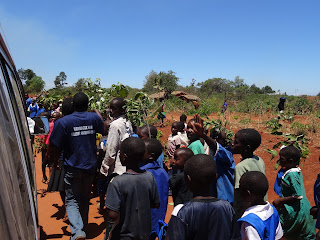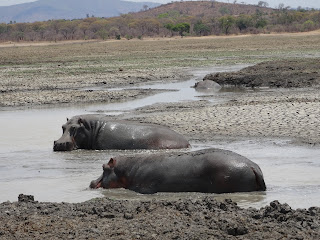I normally write these blogs in the wee small hours in the
Temwa compound in Mzuzu (our home and my office). This time I'm sitting in Njaya Lodge in Nkhata Bay overlooking the beautiful deep blue Lake and
looking across to where it meets the light blue of the sky on the horizon. It’s
unlikely I’ll complete the blog here – we are in the middle of the normal
Sunday electricity load shedding by ESCOM (Electricity Supply Commission of
Malawi) and my lap top has less than one hour charge left. No doubt, I will be finishing it in the wee
small hours when we get back to Mzuzu!
 |
| View from Njaya Lodge where I started writing this blog |
Last weekend was full on.
On Saturday, Temwa had organised a fair in Bula (one hour along the dirt
track road from Mzuzu to Usisya) to celebrate the Early Grade Literacy programme which provides help for children in local schools to improve their literacy levels. It is one of a number of Temwa projects to support education in Nkhata Bay North. Others include bursaries for children to go on to secondary education – education is only free in Malawi up to the end of primary level – and sponsorship for a small number of school leavers to go to teacher training college – with a commitment from them to teach for five years post-qualification in the Nktata Bay North area.
We had planned to leave at
6.30am but this had been put back to 8.30am the evening before. A vehicle hiccup – the Temwa car’s brakes
had failed going down the hill outside the Temwa compound (a good job the same
thing had not happened going down the steep and windy road to the Lake at
Usisya earlier in the week!) – meant we hung around until a minibus arrived to
take us there at about 11.30am.
Our arrival at the fair was impressive. The Temwa Programmes Manager, Emmanuel, who
was guest of honour, and the chair of the local Area Development
Committee (ADC), Ivor, were in the minibus. A large group of children carrying
tree branches and singing ‘you are welcome’ accompanied our minibus into the
village.
 |
| Our arrival at Bula |
There was a wide range of activity at the event: children read poems, recited the alphabet, and performed songs in traditional dress; the Temwa peer educators performed a play which had a central message of allowing children to go to school rather than keeping them off school to work in the fields; there was some traditional dancing by local villagers with a number of the audience – including the elderly Group Village Head – joining in; there was prize giving for success in competitions organised as part of the Early Grade Literacy programme; and there were a lot of speeches (mainly in Tumbuka but with one of the local teachers helpfully translating for us). A particularly inspiring speech was one by a local nurse, who had grown up in the area, talking about the perseverance required to achieve her ambition of becoming a nurse and returning to work in Bula.
 |
| Dyana, the Temwa Education Project Officer and lead organiser of the Bula event |
 |
| Children performing dressed as Ngoni tribes people |
 |
| Local women led a traditional dance accompanied by drums |
Because of our late arrival, the entertainment/speeches didn't start until
around 12.30pm and they went on for almost three hours. Many of the children and adults had travelled
from villages which can be a long way from Bula, getting up at dawn and walking
for two or three hours. Despite this,
and the sometimes quite long speeches, the crowd remained attentive and
appreciative throughout. The commitment
to improvement through education is strong – despite the challenges of walking
long distances, hunger, and the need for children to help families eke out a
living. One of the telling points made
by Ivor, the ADC chair, was how to ensure that there are locally sustainable
ways of feeding children whilst at school.
People have not enough food for themselves (or, if they do, they need to be able
to sell any surplus to generate income) and therefore cannot contribute their own
products... but they might be willing to put time into maintaining plots near
schools for growing cassava and other foodstuffs if land could be reserved for
this purpose. (There’s more detail of the event on the Temwa website which is at http://temwa.org/learning-to-read-and-write-in-northern-malawi/.)
 |
On the prairie - Vwaza Marsh guide Nathan (suitably armed!), AFID volunteer Julie, driver Newton, Temwa micro-finance manager, Maria, and Liz
|
The Saturday trip to Bula was followed by an early start on
Sunday to visit the Vwaza game reserve. The
Malawi tourist industry is relatively small and, if people visit game reserves,
it’s mainly the more accessible ones in the south. Luckily we are already in the inaccessible
north and so it was a relatively easy
drive to get to Vwaza (two hours from Mzuzu – north along the A1 to Rumphi and
then an hour or so along a dirt track west to the reserve which lies on the
border with Zambia). We hadn't come to
Africa with any burning desire to go to a game reserve but visiting Vwaza was a
special experience. There
were hardly any other visitors there so we had the place largely to ourselves
apart from the animals and birds. The main attraction for the animals, particularly during the dry season, is Lake Kazuni - although lake is a bit of a misnomer at this time of year, more a watering hole. The most impressive were the hippos, with
large numbers wallowing in the water and making loud grunting
noises. We were accompanied by a ranger
with a gun and were able to get quite close – apparently more people get killed
by hippos than any other wild animal but they are only dangerous if you get
between them and water. More worrying –
and frightening – was being peered at through the trees by a herd of buffaloes;
the ranger made it abundantly clear that getting out of the car was not an
option! The range of animals and birds sharing the space was incredible - apart from the hippos and buffaloes, warthogs, baboons, monkeys, at least four different types of antelope, guinea fowl (a humble kind of bird to find in such a wild place!), marabou stork and so on. Elephants often come down to the lake in the dry season but the rains of two weeks ago meant they had been staying away - the only evidence we saw was the huge prints in the ground around the watering hole and the dried up dung.
 |
| Hippos up close |
 |
The buffaloes kept a close eye on us
 |
Kudus were my favourites of the antelopes we saw - look at those ears!
|
|
 |
A family of warthogs
|
It's hot here - well into the 30s every day (apart from the two days of storms we had) - and the idea of going out after we came back from Vwaza was not very appealing; we were hot and sweaty and I, for one, just wanted a shower and a bit of kip but...the Black Missionaries, one of Malawi's top bands, were in town and playing at the Mzuzu Lodge. We could hear the music across the valley and decided we couldn't miss it...so the shower was followed by a taxi trip to Mzuzu Lodge. I don't often go to gigs but, after this one, I could be persuaded to go to more. The Black Missionaries and their support band were great performers; the location was brilliant - Mzuzu Lodge has large open spaces with good views over the rolling Mzuzu hills; the crowd was just having fun. There were stalls selling various 'rasta' products and I paid 1,500 kwachas (£1.80) for a 'Blacks' (the nick name for the Black Missionaries) hat. We stayed there until the band sung their last song at 10pm so I didn't get my kip!
 |
| The Black Missionaries were great performers |
So here we are - or were (I am now once again in the office finishing this in the wee small hours) - back at Njaya Lodge in Nkhata Bay. I had a good balance between refreshing dips in the Lake, a visit with Dixon (who works at Njaya Lodge) to a very hot and sweaty football bar, an early start to see my fourth dawn/sunrise at the Lake (followed by a welcome return to bed), some lovely butter fish straight out of the Lake, and a fair amount of 'kipping' which I needed after the previous weekend.
 |
| Sun-rise over the Lake...again!! |
 |
The double screen at the Sports Bar in Nkhata Bay. You can't get a proper sense of the heat of the place from the photo.
We have sorted out our plans for the Christmas break - Livingstonia, with wonderful views of the Lake, for Christmas itself, and Likoma, an island on Lake Malawi close to Mozambique, for New Year. We also have plans to go back to Njaya Lodge for an overnight stay before Christmas. And Liz is hatching a plan to take a January break in Zanzibar with her friend Jackie. So we won't be short of things to do...
|














I love the scenery of the Bula Hills on the way to Usisya.
ReplyDeleteUnder whose authority (T/A) are the Bula Hills?
If I had the means, I would make Usisya accessible by Cable Cars from Bulla Hills down to the Lake at Usisya Beach.
The lake is beautiful, the waters clear all year round!